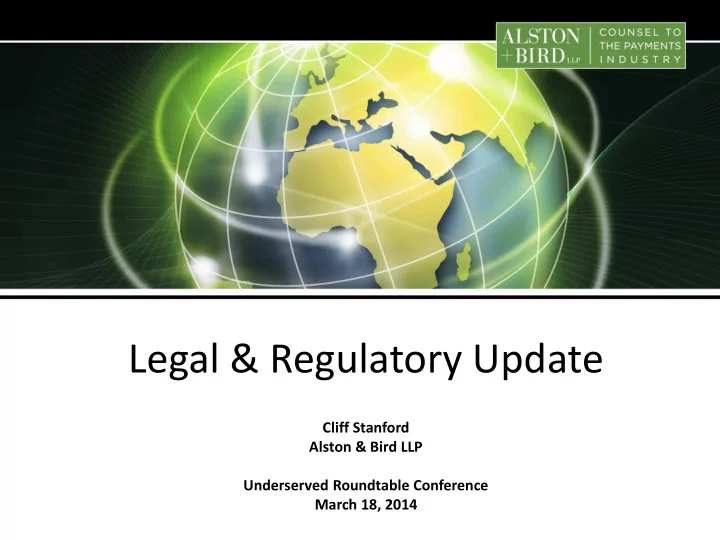

Legal & Regulatory Update Cliff Stanford Alston & Bird LLP Underserved Roundtable Conference March 18, 2014
Disclaimer • Nothing in this presentation is or is intended to be legal advice. • Please consult with your own legal counsel for guidance specific to your organization or situation. • The views expressed are my own and not those of Alston & Bird or any client of Alston & Bird. 1
Themes • Enforcement • Regulation • Market Intervention 2
Enforcement 3
Operation Choke Point • DOJ suing banks offering accounts to payment processors debiting consumer accounts in facilitation of fraud or illegal payday lending • Wachovia (2008) – Ignoring complaints and high return rates • Four Oaks Bank (2014) – Payday lenders debiting accounts even in states where payday lending is not permitted • Lawsky letter: implies banks are responsible for ensuring that underlying products are valid under applicable law • NACHA proposal to ban ACH access to payday lenders that violate state law 4
Novel Civil Enforcement Approaches • FDIC (First California Bank): reach through bank to “institution affiliated parties” for enforcement of UDAP/UDAAP – Alternative credit scoring (via payment history) does not legitimize “build your credit” promotions • CFPB (CashCall): UDAAP violations alleged against those who fund, purchase, service and collect Tribal payday loans exceeding usury limits under state law 5
CFPB v. Cash America (2013) • First enforcement action against payday lender • $14MM restitution; $5MM fine • Violations: – Robo-signing court documents in collections – Usurious lending in violation of Military Lending Act (only federal usury rate) – Impeding CFPB exam by destroying records 6
Rewarding Good Behavior • US Bank (June 2013) – Self-reported problems with SCRA compliance (TILA and UDAAP) – Restitution only, no civil money penalties • CFPB Guidance: “Responsible Business Conduct: Self- Policing, Self-Reporting, Remediation, and Cooperation” – Four elements to mitigate the potential enforcement action – Response to industry reaction to the Big Bang • Will the FDIC, OCC, Fed follow suit? 7
Regulation 8
9
Principles Based Regulation “Putting down rules here and there can be like putting down fence posts on the prairie: They can be too easy to run around. And when the lawyers show everyone how to jog around the fence posts, the regulator responds with more rules. Pretty soon, there are so many rules that it is hard to move. . . . We can choose a better way.” • Elizabeth Warren to House Financial Services Committee, March 2011 Unfair, Deceptive, or Abusive Acts or Practices (UDAAP) • Technical compliance is necessary but not sufficient • Impact on product design? • – “Show me where it says I can’t do that” Compare the Prescriptive, Rules-Based approach: • – E.g., Remittance Transfer Rules, Qualified Mortgage Rules 10
Regulation by “Guidance” • Deposit Advance Loans (FDIC, OCC) • Third Party Oversight (FDIC, OCC, CFPB) • Payment Processors (OCC, FDIC) • Responsible Business Conduct (CFPB) • UDAAP Definitions (CFPB examination manual) 11
Outright Ban Approach • FTC has proposed to amend Telemarketing Sales Rule to prohibit telemarketer use of remotely created checks (RCCs) and remotely created payment orders (RCPOs) – Telemarketer only requires a deposit account, not a merchant processing account or an ACH processing relationship – Inherently “unfair” in telemarketing context? – Consumers do not receive the same protections with RCCs and RCPOs as they receive when using credit/debit cards or ACH entries 12
State Law Landscape Impedes Innovation? • 50 state landscape for prepaid cards in certain payment contexts – Payroll – Workers Compensation, etc. • Money transmitter licensing • Lender licensing – Proposed national charter for AFS? 13
Direct Market Entry 14
Postal Banking? • January 2014 USPS Inspector General issues white paper on postal banking to reach underserved communities – GPR cards – Small $ loans • Historical precedents in US; examples abroad • Or, “the worst idea since the Edsel”? 15
Affordable Care Act • ACA does not mandate payment type • However, HHS has ruled that all issuers must accept (at least) checks, money orders, EFT, and GPR cards – HHS added prepaid in response to “overwhelming support” for these cards in comments on the proposed rule • Policy interests in broad-based health cover and in limiting fees on underbanked at odds? 16
Federal Reserve 2013 Consultative Paper Ubiquitous electronic solutions for making retail payments that do not • require the sender to know the bank account number of the recipient. Confirmation of good funds will be made at the initiation of the payment. • The sender and receiver will receive timely notification that the payment • has been made. Funds will be debited from the payer and made available in near real time • to the payee. Reducing the average end-to-end (societal) costs of payment transactions, • resulting in innovative payment services that deliver improved value to consumers, businesses, and governments. Consumers and businesses have better choice in making convenient, cost- • effective, and timely cross-border payments from and to the United States. 17
Questions? Cliff Stanford Alston & Bird LLP (404) 881-7833 Cliff.Stanford@alston.com
Recommend
More recommend